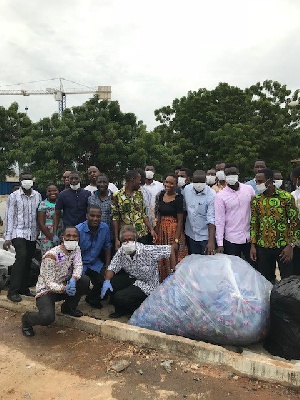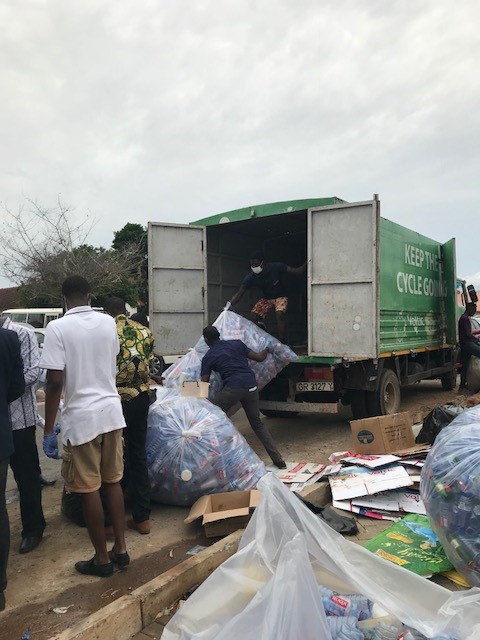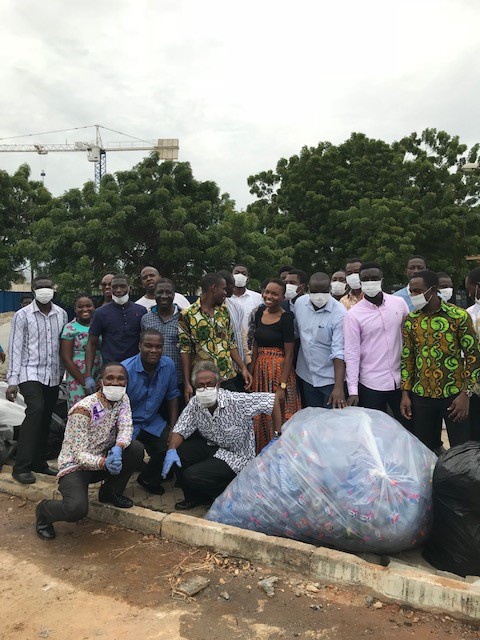 Legon Interdenominational Church members carried out a cleaning exercise
Legon Interdenominational Church members carried out a cleaning exercise
Despite persistent calls from environmentalists and other interest groups, Government is unable to ban the use of plastics in Ghana due to the absence of a policy. This is according to the Minister for Environment Science Technology and Innovation Professor Frimpong Boateng (source: https://citinewsroom.com/2018/04/11/govt-cannot-ban-plastics-now-minister/).
The Minister did however disclose ongoing consultations to develop such a policy. Plastic waste contributes the bulk of filth engulfing our nation. Ghana has a history of half a century of plastic manufacturing, with companies currently producing over 30,000 metric tons of plastic products, complemented by tens of thousands of plastic products imported from across the globe. Against the prediction that by 2050 there will be more plastic in the ocean than fish, the United Nations has dedicated its Sustainable Development Goal (SDG 14) Ocean Conference to fighting the plastics menace. It is a known fact that nations that have banned the use and production of plastics or have imposed taxes on companies producing or using plastics have seen significant drops in its use.
Plastic Waste a Challenge and Opportunity:
Plastic waste recycling provides opportunities for effective waste management as well as employment and income opportunities for many. If Ghana, like developed countries, could recycle even half of its plastic waste, millions of gallons of oil and cubic meters of landfill space could be saved annually. Indeed, a feasibility study on plastic waste conducted by the Centre for Scientific and Industrial Research (CSIR) estimated GHC1.2 million could be realized monthly if plastic waste generated in Ghana could be recycled (source: The Ghanaian Times, 2013). So why has plastic waste recycling not caught on as rapidly, considering the mounting environmental hazards posed, including reported deaths due to flooding as a result of choked gutters and drains?
Government alone cannot fight the Plastic Waste Menace:
Government alone cannot effectively fight the engulfing battle of plastic waste management. Success will require concerted and organized stakeholders’ efforts and responsibility beginning with individuals, families, institutions of every type and level (educational structures and systems especially) as well as law enforcement agencies.

This article is focused on the pioneering efforts of the Legon Interdenominational Church (LIC) which since 2014 is showing the way in efforts to deal with the plastic waste menace through sensitization of its congregation and strategic partnerships. An educationist and Social Marketing expert is guiding the process which is driven by a number of Champions.
Social Action Ministry (SAM):
In 2014 LIC’s Social Action Ministry (SAM) initiated the Plastic Waste Project with the primary objective to promote the culture of waste separation and proper waste disposal among the congregation and by extension the wider public. SAM’s ultimate goal in implementing this project is to contribute to national efforts to keep Ghana clean.
Prior to the official launch of the project, the Leadership of SAM spent months clarifying the project concept and planning and negotiating with LIC’s Council of Elders (COE) which permitted SAM to make structured presentations to the congregation to sensitize them to the dangers and social cost of indiscriminate waste disposal. SAM’s message was clear and concise. How can individuals contribute to keep Ghana clean by separating their waste (specifically plastic) which contributes the bulk of the waste engulfing our nation?

Convinced of the social impact of the project objectives, COE officially endorsed the project and designated a collection point and date for collection. LIC members have committed to separate and store plastic waste from their homes, offices, schools, communities, etc. throughout each month. On the first Sunday of every month, they bring and deposit their plastic waste at the designated collection point with the strict supervision of SAM’s Leadership. SAM members serve as volunteers for the project. Each volunteer is provided with appropriate personal protective equipment such as reflective vests, overalls, gloves, nose masks and hand sanitizers. In-between months, COE permits SAM to make announcements during the Sunday service to remind the congregation of their commitment and the next collection date.
Collaboration with Cultivating Minds Foundation (CFM):
At the start of the project, SAM identified and collaborated with Cultivating Minds Foundation (CFM), an indigenous non-governmental organization (NGO) with suicide prevention as its mission. Each month, CMF provided transportation and labour to convey the waste from LIC to a sorting and crushing location before transporting to a recycling plant at Tema for sale.
CMF made and retained negligible proceeds which went to support victims of suicide attempts. Both SAM and CMF remained mutually committed to their roles and efforts in sustaining the project which they highly consider as a national duty worthy of emulation by other faith-based organizations. Over time the project saw rapid expansion.

Collaboration with Environment360:
Convinced of patriotic objectives and at the invitation of SAM, LIC’s two neighboring churches – the Anglican Church and the Catholic Church – joined the project. Soon a number of off-campus individuals and institutions also came aboard either as contributors of plastic waste or as volunteers. The growth and success of LIC’s Plastic Waste Project is made evident by the fact that with the increasing volumes of waste collected, and faced with the challenge of high overhead costs, SAM sought and found a new partner. Early 2017, it identified and commenced collaboration with Environment360, an organization credited for being the first successful plastic waste recycling organization in Ghana.
Environment360 currently collects over 2000 tons of plastic wastes every month for recycling. Environment360 has provided large depositing bins sited on the premises of each of the three churches involved in the LIC project. The provision of these bins allows members to bring their plastic waste throughout the month. The partnership with Environment360 in managing the weekdays and once-a-month collection program has resulted in a more efficient and convenient system for patrons of the LIC project.
Envisioning a Critical Mass of Champions:
With a growing interest and support of the University Administration and LIC’s Council of Elders, there’s every indication that SAM’s plastic waste project is a success story with growing opportunities and untapped potential for campus-wide and nation-wide emulation and social action. Indeed this is the vision of LIC’s Social Action Ministry as it strengthens its collaboration with Environment360. LIC’s Leadership firmly believes in the need to sustain the high commitment exhibited by the congregations of the three neighboring churches and all stakeholders involved in the project.
Also, SAM’s vision is to achieve a critical mass of champions to steer and positively impact the culture of waste separation and waste management in Ghana. Charity, we know, begins at home so the wider university community, children and youth in particular are gradually embracing the culture of waste separation and proper disposal through the LIC Social Action Ministry plastic waste project.
Towards Sustainability:
Without doubt, LIC’s plastic waste project offers a shining model for emulation by faith-based organizations, educational institutions and corporate bodies in Ghana who can and should be encouraged to model LIC’s experience. Indeed, in recent times, a number of faith-based leaders have openly declared strong support for Government’s efforts to keep Ghana clean and to protect the environment. A concerted collaborative effort will certainly drive the national vision to achieve results.
From a professional perspective Auntie Alice, the educationist and Social Marketing expert guiding the project, believes a social marketing approach built around persistent sensitization of change in individual knowledge, attitudes, behaviors and practices (KABP) is the first step supported by well-thought-out and well-designed systems and structures in support of the expected behavior change. Sanctions will have an important role to play for the desired results to be achieved and within reasonable timelines.

Sensitization should cut across all levels beginning with the individual, households, communities, social groupings, municipal and district assemblies, etc. Mass and social media communication strategies are cost effective if complemented by targeted grassroots training and equipping of community and group based motivators and champions such as Uncle Paul and Sister Angelina in the case of the LIC plastic waste project. Thankfully, a number of media houses have already initiated Clean Ghana Campaigns, thus setting the momentum for national action against this growing plastic waste menace.
Absence of systems and logistics i.e. the provision of clearly labeled receptacles and bins in support of the culture of waste separation remains a major challenge. Clearly labeled receptacles and bins must be made available at all levels of household, institutions, communities. Municipal and District Assemblies, faith-based organization, Community Leaders all have an important role.
There is no need reinventing the wheel; the way has already been shown by LIC and its partners. Let us, therefore, join hands to make the plastic menace a thing of the past.